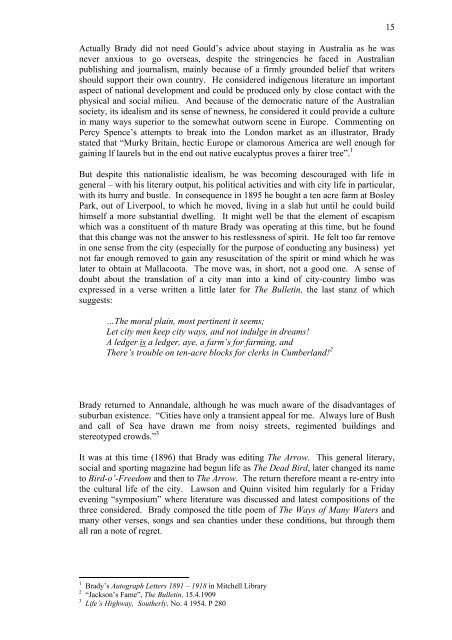A CRITICAL BIOGRAPHY OF EDWIN JAMES BRADY - Mallacoota ...
A CRITICAL BIOGRAPHY OF EDWIN JAMES BRADY - Mallacoota ...
A CRITICAL BIOGRAPHY OF EDWIN JAMES BRADY - Mallacoota ...
You also want an ePaper? Increase the reach of your titles
YUMPU automatically turns print PDFs into web optimized ePapers that Google loves.
Actually Brady did not need Gould’s advice about staying in Australia as he was<br />
never anxious to go overseas, despite the stringencies he faced in Australian<br />
publishing and journalism, mainly because of a firmly grounded belief that writers<br />
should support their own country. He considered indigenous literature an important<br />
aspect of national development and could be produced only by close contact with the<br />
physical and social milieu. And because of the democratic nature of the Australian<br />
society, its idealism and its sense of newness, he considered it could provide a culture<br />
in many ways superior to the somewhat outworn scene in Europe. Commenting on<br />
Percy Spence’s attempts to break into the London market as an illustrator, Brady<br />
stated that “Murky Britain, hectic Europe or clamorous America are well enough for<br />
gaining lf laurels but in the end out native eucalyptus proves a fairer tree”. 1<br />
But despite this nationalistic idealism, he was becoming descouraged with life in<br />
general – with his literary output, his political activities and with city life in particular,<br />
with its hurry and bustle. In consequence in 1895 he bought a ten acre farm at Bosley<br />
Park, out of Liverpool, to which he moved, living in a slab hut until he could build<br />
himself a more substantial dwelling. It might well be that the element of escapism<br />
which was a constituent of th mature Brady was operating at this time, but he found<br />
that this change was not the answer to his restlessness of spirit. He felt too far remove<br />
in one sense from the city (especially for the purpose of conducting any business) yet<br />
not far enough removed to gain any resuscitation of the spirit or mind which he was<br />
later to obtain at <strong>Mallacoota</strong>. The move was, in short, not a good one. A sense of<br />
doubt about the translation of a city man into a kind of city-country limbo was<br />
expressed in a verse written a little later for The Bulletin, the last stanz of which<br />
suggests:<br />
…The moral plain, most pertinent it seems;<br />
Let city men keep city ways, and not indulge in dreams!<br />
A ledger is a ledger, aye, a farm’s for farming, and<br />
There’s trouble on ten-acre blocks for clerks in Cumberland! 2<br />
Brady returned to Annandale, although he was much aware of the disadvantages of<br />
suburban existence. “Cities have only a transient appeal for me. Always lure of Bush<br />
and call of Sea have drawn me from noisy streets, regimented buildings and<br />
stereotyped crowds.” 3<br />
It was at this time (1896) that Brady was editing The Arrow. This general literary,<br />
social and sporting magazine had begun life as The Dead Bird, later changed its name<br />
to Bird-o’-Freedom and then to The Arrow. The return therefore meant a re-entry into<br />
the cultural life of the city. Lawson and Quinn visited him regularly for a Friday<br />
evening “symposium” where literature was discussed and latest compositions of the<br />
three considered. Brady composed the title poem of The Ways of Many Waters and<br />
many other verses, songs and sea chanties under these conditions, but through them<br />
all ran a note of regret.<br />
1 Brady’s Autograph Letters 1891 – 1918 in Mitchell Library<br />
2 “Jackson’s Fame”, The Bulletin, 15.4.1909<br />
3 Life’s Highway, Southerly, No. 4 1954. P 280<br />
15


